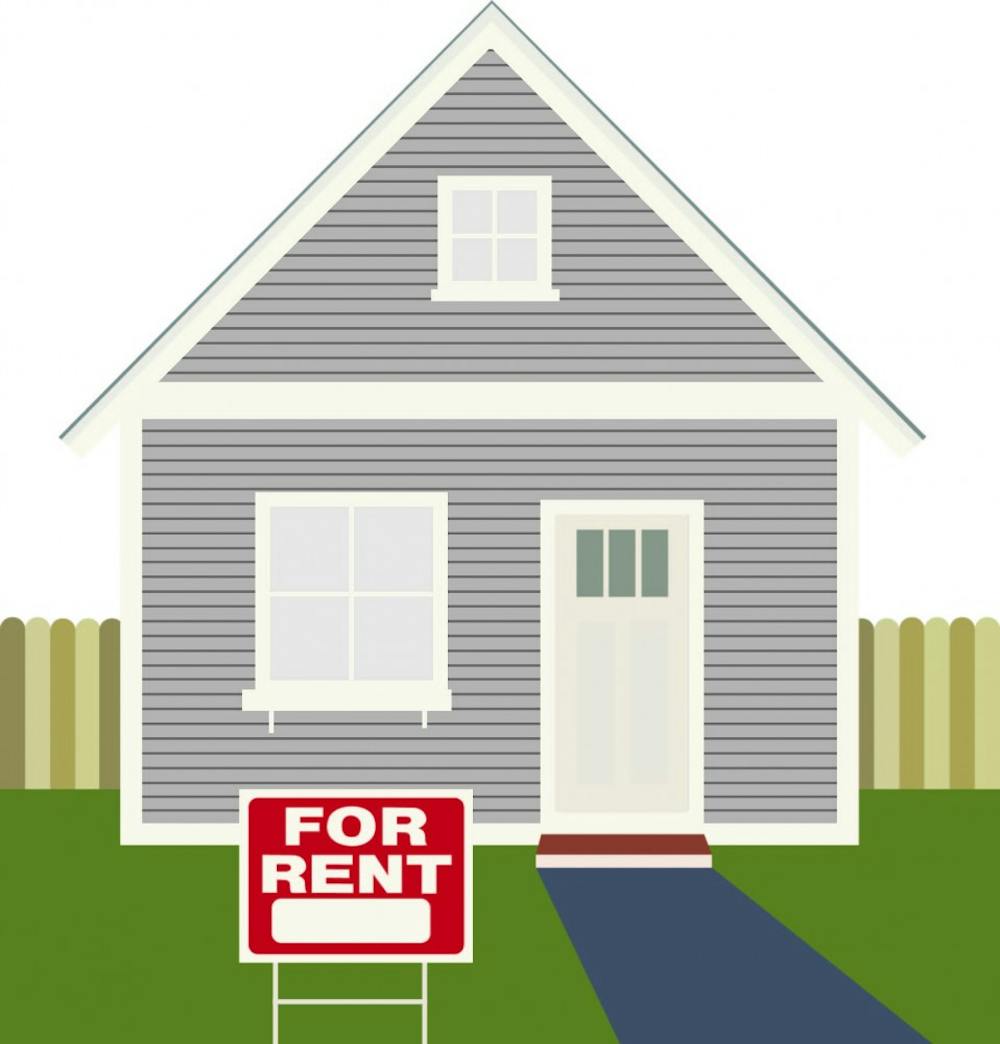When Darren Sible first saw his future house, he knew he wanted to sign the lease.
It had hardwood floors, just the right amount of bedrooms and a lot of character. The only problem — the landlord told him that he didn’t like college students, which Sible, now a senior English education major, was a little put-off by. But he and his roommates planned on being good tenants, so they signed the lease.
After they moved in, there were a few things wrong with the house, like a missing door and door knobs, wet spots on the ceiling and a hole in the kitchen floor that they could see the basement through. When they asked the landlord to fix these things, the real problems started.
“A couple of weeks after we moved in, I put all these down on the list of things that were wrong, and he said he’d take care of them. I asked him a few weeks later when that was going to happen and he called me back and blew up on me,” Sible said. “[He said], ‘You’re just being so demanding. You’re finding things to complain about. This is just your problem. I’ve never had someone complain about so many things in this house before. You’re just being needy and whiny.’”
The problems continued from there — a pipe burst and their water was almost shut off by the city for their landlord’s failure to pay the bills. Sible said he didn’t know he could have taken legal action against his landlord.
Landlord and tenant disputes are cases Ball State’s student legal department knows all too well, John Connor said. Connor, who manages Student Legal Services, said out of all the cases the department dealt with during the 2014-15 school year, 186 — or 25 percent — were rental issues.
The city of Muncie has a rental ordinance called the Muncie Housing Code of 2002 that outlines the rules for landlords and their properties, but due to a lack of funding, inspectors only come to houses after getting a complaint.
Tom Davis, HVAC and plumbing inspector for the city of Muncie, said when the ordinance was passed in 2006, his department wasn’t given the money to advertise it, and they don’t charge for inspections.
“I don’t know if we’ve ever published anything in the paper or any kind of mainstream type thing,” Davis said. “I don’t really know how well this ordinance is advertised ... because I still will run across landlords in parts of town that don’t have a clue that there’s all these regulations on renting property.”
Davis said when the Building Commission receives a complaint, an inspector schedules an appointment with the residents of the building. Even if the complaint was only about one part of the house, an inspector checks the whole house against the ordinance.
Connor said the inspectors have been very helpful in resolving problems between landlords and students and addressing safety concerns. He said his colleagues at Indiana University and Purdue University said they experience similar landlord/tenant issues.
If an inspector were to look at Alex Balestra’s house, the senior music media production major said he’s sure it would be condemned between the poor insulation, rampant black mold and faulty heating system.
Balestra moved into his house two years ago. He said he and his roommates were impressed with the low rent and were glad to find a place where they could all live together. They didn’t realize the problems until after they moved in, which Balestra said was due to their landlord rushing them to sign the lease.
“I like to think that because of the condition of the house and how really just awful a place it is to live … that our landlord just saw a bunch of kind of gullible kids that were willing to live there and just got us to sign the lease really quick,” Balestra said. “Since then, he’s been kind of nonexistent.”
Balestra said he hasn’t seen his landlord since he signed the lease in the middle of the 2013-14 school year. Similarly to Sible, Balestra said he didn’t notice many of the problems until after they moved in.
The first problem was the water heaters, piping and furnaces didn’t work. When he called the gas company to come and fix it, the workman told him the furnaces hadn’t been cleaned out for about 20 years. It took two months to get them working again.
According to section 155.30 of the Housing Code, “Basic Facilities,” “Every dwelling shall have heating facilities, and the owner of the heating facilities shall be required to see that they are properly installed, safely maintained, in good working condition, and that they are capable of safely and adequately heating all habitable rooms.”
Each habitable room — a room used for eating, sleeping or living - is required to have a window, but Balestra said one of the rooms the landlord counted as a bedroom was windowless and didn’t have airflow to it. He and his roommates use it as a storage area instead.
Finally, Balestra and his roommates had to scrub the entire basement with bleach to get rid of the black mold growing rampant when they moved in. According to the ordinance, landlords should keep the interior of their houses “maintained in a clean and sanitary condition free from any accumulation of rubbish or garbage.”
Balestra declined to give the name of his landlord. The Daily News also reached out to Sible’s landlord April 20, but he did not respond for comment.
Sible, who moved out of his house as soon as his lease was up, said after his experiences with his landlord he’s a lot more careful about who he rents from. He asks for references and tells his friends not to rent from his former landlord.
Balestra renewed his lease another year to save the hassle of house hunting and trying to find a place to fit all five of them again. He said students should make sure to do their research before signing anything.
“Don’t sign too quickly like we did. We really jumped on the opportunity for a house that was … really big and … really affordable — or at least it appeared affordable,” Balestra said. “Do a little research, don’t act quickly and really, really consider your options.”
Davis said renters should educate themselves on how to maintain a house before they sign their leases. Reading books and watching video about home repair and upkeep would help, he said.
“I can just walk in a place and tell you whether it’s right or not just from my experience,” Davis said. “If you look through any of that literature about maintenance on a rental property or your own home, it’s going to make you aware of what to look for as far as potential properties.”
Likewise, Connor encourages students to bring him their leases before they sign them, so he can go over the details and figure out potential problems and issues. Many times, students don’t come into the office until there’s a problem.
“I would prefer to handle it from a preventive-type situation where I could talk to students about how to prevent problems by reviewing their leases before they sign them, by considering their roommate selections and things like that,” Connor said. “Too often I’m dealing with problems that could have been avoided with a little foresight.”
Despite some of the horror stories, Connor said there is no reason to be distrustful of landlords in Muncie or to make generalized statements about what they’re like.
“Landlords are like everybody else. They come in all different dispositions,” Connor said. “I’m sure there are some landlords out there that will take advantage of people that are young and naïve, but we also have some very good landlords, … landlords with a lot of integrity.”






The Daily News welcomes thoughtful discussion on all of our stories, but please keep comments civil and on-topic. Read our full guidelines here.